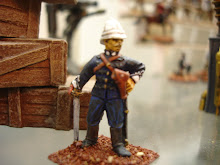I have visited the white cold stuff on a few occassions, and even spent some time figuring out how to go down a mountain covered with the crap while balanced precariously on two thin strips of wood. Why anyone would do this for fun, I don't know, but to each their own, I suppose.
The real point of this post, though, is to ask for comments on how to model snow on the gaming table.
Naturally, a large heavy white cloth could do for an entire table. But for features, how do you put snow on them? Let's assume the project is a cluster of large rocks, covered with snow, and a snowy base around them. The rocks are easy - carved and painted foam, attached to a base of either MDF or plywood, depending on what you use for snow. Trying for something kinda like this:

But what do you use? Soap flakes? Powdered sugar (ants in no time)? I bought some snow effect stuff that is designed to be used on those seasonal displays, but I haven't tried it out yet and have no idea how long it will last, etc.
So, guys and dolls, what do you recommend?

2 comments:
For my 10mm gaming I have used Soft Flake Snow from Woodland Scenics mixed with white glue. It works well. I just discovered Liquitex Ceramic Stucco which is a Texture Gel. It goes on really easy and I think it looks like snow. It isn't as white as the Woodland Scenics, but it says it can be mixed with paint. So I guess you could mix in white paint with it.
Eric
I have used white glue and icig sugar. It was a technique used by a modeller at The Games Workshop store in Dudley, West Midlands.
My own take on the process was mix 50/50 white glue and icing sugar (or artificial sweetener) together and 'gloop' onto the finished and painted base. You can add some white paint to the mix and once fully dry the snow should be varnished and again once again can be highlighted with pure white acrylic paint.
This technique is well worth testing out as the finish is very realistic.
Tony
Post a Comment